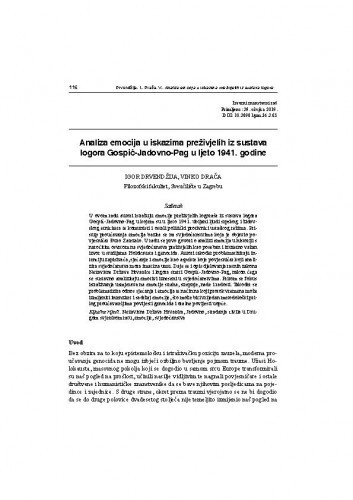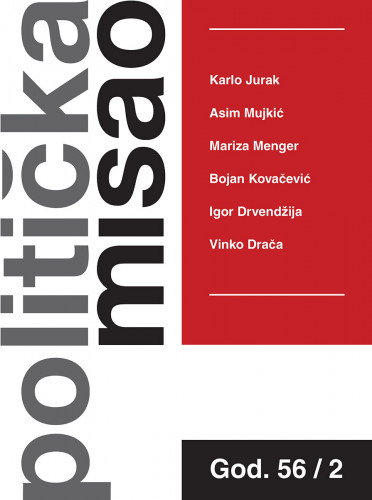U ovom radu autori istražuju emocije preživjelih logoraša iz sustava logora Gospić-Jadovno-Pag u kojem su u ljeto 1941. ubijani ljudi srpskog i židovskog etniciteta te komunisti i ostali politički protivnici ustaškog režima. Pristup proučavanja emocija bazira se na svjedočanstvima koja je objavio povjesničar Đuro Zatezalo. U radu se prvo govori o analizi emocija u historiji s naročitim osvrtom na svjedočanstva preživjelih kao poseban i izuzetno važan izvor u studijama Holokausta i genocida. Autori također problematiziraju intenciju zapisivača, sjećanje i emocije kao aspekte koje povjesničar koji analizira svjedočanstva mora imati na umu. Daje se i opis djelovanja rasnih zakona Nezavisne Države Hrvatske i logora smrti Gospić-Jadovno-Pag, nakon čega se sustavno analiziraju emotivi izneseni u svjedočanstvima. Pritom se fokus istraživanja usmjerava na emocije straha, strepnje, nade i radosti. Također se problematizira odnos sjećanja i emocija te način na koji protok vremena može izmijeniti intenzitet i sadržaj emocije, što može biti vrijedan metodološki prilog proučavateljima povijesti genocida i oralne povijesti uopće.; In this paper the authors analyze the emotions of survivors of the camp system Gospić-Jadovno-Pag, where people of Serb and Jewish ethnic descent were murdered during the summer of 1941, as well as communists and other political enemies of the ustashi regime. The approach to the study of emotions is based on the eyewitness accounts published by the historian Đuro Zatezalo. The paper starts with an analysis of the emotions in history with a particular emphasis on the testimonies of survivors as a distinctive and extremely important source in the studies of the Holocaust and genocide. Afterwards, the authors examine the intentions of those who collected the testimonies, as well as memories and emotions as aspects which a historian who researches testimonies ought to have in mind. A description of the impact of race laws issued by the Independent State of Croatia is provided together with an overview of the history of the camp system Gospić-Jadovno-Pag, followed by an analysis of the emotives expressed in the testimonies, with the focus on the emotions of fear, anxiety, hope and joy. The relation between recollection and emotions is also discussed, in addition to the way in which the flow of time can alter the intensity and the contents of emotion, which can provide a valuable methodological insight to the researchers focusing on the history of genocide and oral history.
Sažetak

 Politička misao : Croatian political science review : 56,2(2019) / glavni i odgovorni urednik Dejan Jović.
Politička misao : Croatian political science review : 56,2(2019) / glavni i odgovorni urednik Dejan Jović.